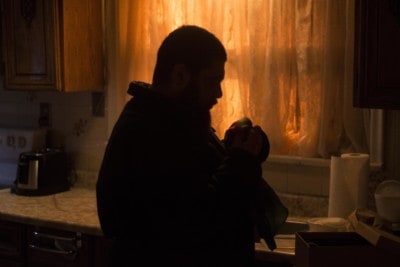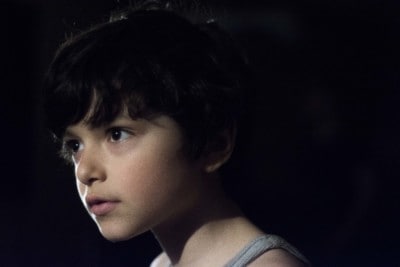Reem Morsi had a career of professional scuba diving and human rights activism prior to becoming a writer and director. Her feature film script, Bootleg, won the Telefilm Canada New Voices Award at the Toronto Screenwriters Conference in 2017. Last weekend, The Door (co-written by Morsi), clinched the Best Screenplay award at the WIFT-T (Women in Film & Television–Toronto) Showcase. The Door follows the struggle of a Syrian family who has lost their mother. A young boy and his grandmother attempt to bring her back through her clothing and belongings, but the family is shattered even further when she seems to reappear.
We asked Morsi about the film this week.

SDTC: Where did your inspiration for The Door come from?
The Door is based on a short film I wrote and directed and my sister produced a few years ago, Nostalgia, which screened at the WIFT-V (Vancouver) festival. As an immigrant with no family in Canada and having lost both my parents, I was having a very tough night, with terrible stormy weather and lack of inspiration and I felt that I needed a hug from my mother and how it would be amazing if she were there to hug me.
I thought about orphaned children and how they lack that love and tenderness. So, the short that was made years ago was a silent, B&W, ten-minute short about two abandoned children living in a world of abandonment, and it’s only the two of them left (as many orphaned children feel).
As the situation in Syria deteriorated, I wanted to develop the project further, and so I made a twenty-minute colour film with dialogue, sparse as it is, as the lives of many refugee families is filled with a tough past full of loss and trauma and it may never end and handling this trauma takes different forms, which is what The Door is also about.
Do you see this as a feature film one day, or is it intended to remain a short?
There are so many story details and genre twists I wanted that I couldn’t include in a short film and I would love to make a feature out of The Door. As it stands, it’s a short until hopefully the possibility of making a feature of it comes along.

Which character most strongly resonates with you personally, and why?
The experience of the three characters dealing with loss resonates with me, but the child is the one that resonates with me the most. I think it’s because I have experienced loss around the same age as the child, and I feel like the child; keeping the possessions and memories of loved ones is my way of dealing with loss and keeping them alive.
What do you hope audiences take away from this film?
I hope that the audience will be able to empathize with the state of refugees and how horrific it is to experience war and loss in such great magnitude. People sometimes dismiss and underestimate the plight of refugees, but it is really something unbearable and I can’t even imagine how it feels to experience that. This film is also about the different ways we deal with grief, and as a film that has little exposition, I hope the audience will be moved by it and interpret it in their own way, reflecting on their own experiences.




 Follow Us On Instagram
Follow Us On Instagram
